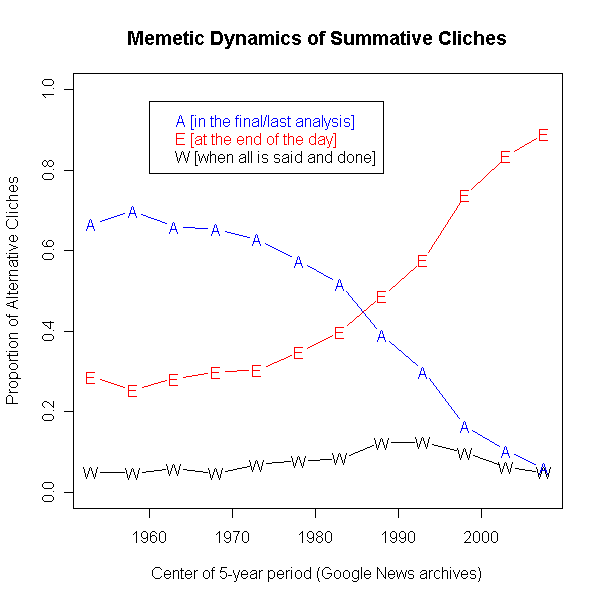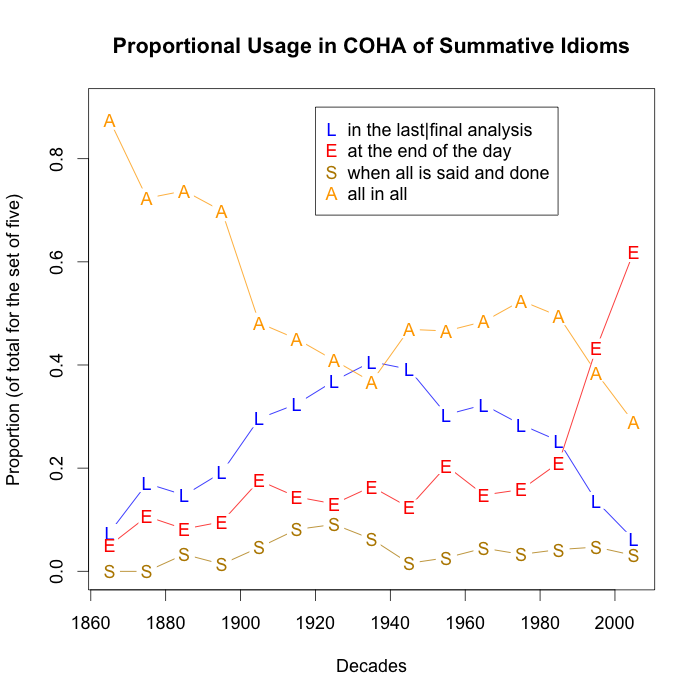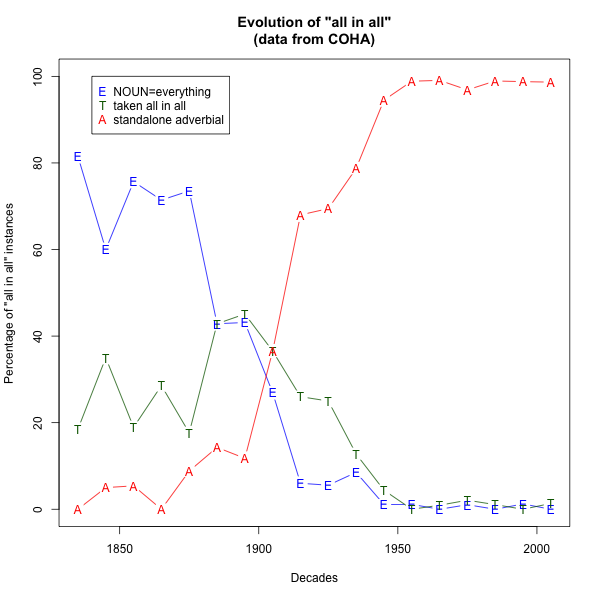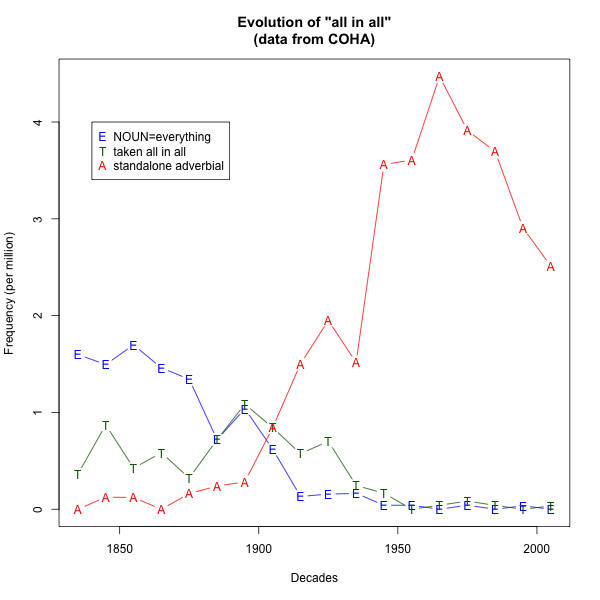Why no "all in all" peeving?
« previous post | next post »
The words and phrases that annoy people are typically criticized as over-used, illogical, fashionable among a disliked group, or shifted in a confusing way from an earlier meaning. It's often true that such irksome usages have indeed increased in frequency — thus "at the end of the day", which was the Plain English Campaign's choice for "most irritating phrase" in 2004, was then towards the end of a rapid rise in relative frequency ("Memetic dynamics of summative clichés", 9/26/2009):
Like other stereotypes, the association of despised usage with despised groups ("The social psychology of linguistic naming and shaming", 2/27/2007) is not very accurate at all ("Moving low-hanging fruit forward at the end of the day", 9/26/2009; "'At the end of the day' not management-speak", 9/26/2009). But the perceived increase in frequency, though sometimes an illusion, is often accurate.
Still, the birth of these socially-recognized crotchets and irks ("peevogenesis"?) seems to involve a considerable amount of randomness. Some usages that are new (or at least have rapidly grown in relative frequency), that are illogical (or at least are not transparently compositional), and that displace a useful older meaning, nevertheless do not seem to annoy anyone. I happened on an interesting example recently while replicating in COHA the little study of summative idioms that I'd previously done using Google News archives.
The replication confirmed that "at the end of the day" increased rapidly in relative frequency after about 1970:
But this time I added the phrase "all in all", which led me to wonder where "all in all" comes from. It's not syntactically or semantically transparent — we don't say "some in all" or "some in some" or anything else remotely close. The fact that "in all" also exists helps a bit, but it's still pretty opaque. And when I looked it up in the OED, I discovered that the only meaning offered there for all in all is "All things in all respects, all things altogether in one", with the following citations:
1539 Bible (Great) 1 Cor. xv. 28 That God maye be all in all. [So 1611; Wyclif, alle thingis in alle thingis, Tindale, all in all thinges.]
1614 R. Carew Excellencie Eng. Tongue in W. Camden Remaines (rev. ed.) 44 Will you haue all in all for Prose and verse?
1767 J. Fordyce Serm. Young Women I. i. 27 Mirth and diversion are all in all.
a1824 Campbell On receiv. Seal xii, The all-in-all of life—Content!
1824 Byron Don Juan ii. clxxxix, They were All in all to each other.
1832 Tennyson New Year's Eve vi, in Poems (new ed.) 97 Their Flemish go-between And all-in-all.
1859 Tennyson Vivien 248 And trust me not at all or all in all.
Similarly, Webster's 1913 gives all in all only the gloss "a phrase which signifies all things to a person, or everything desired".
So as this morning's Breakfast Experiment™, I decided to track the change. I decided to classify instances of the string "all in all" (monocase) into three sets, exemplified by the following examples:
(1) Is God my all in all?
His heart panted for the day when they could be all in all to each other.
The consequence was natural; the boys, being left so much to themselves, became all in all to each other.
We Mardians talk as though the future was all in all; but act as though the present was every thing.
(2) Take it all in all, " Horseshoe Robinson " is a work which should be found on every book-shelf, not only because it is a most entertaining story, but because of the wealth of valuable information concerning the colonists which it contains.
That is a very just criticism, take it for all in all, which first appeared in the North American
He was a man, take him for all in all, We shall not look upon his like again.
The street that runs west next to us leads directly to the chief gate of the city; and taking all in all, I consider that we shall make money yet out of our detention here.
But, taken for all in all, by far the finest, though in some details not the most correct, presentations of whales and whaling scenes to be anywhere found, are two large French engravings, well executed, and taken from paintings by one Garnery.
(3) Perhaps many of Tim's confidences were given half in jest, and perhaps Chieftain sometimes thought that Tim was a bit slow in perception, but, all in all, each understood the other, even better than either realized.
It was, all in all, the most ubiquitous feature of the landscape.
All in all, a typical cross-section of "smart" New York.
But all in all, Solti found the tour the most exciting time of his Musical life.
Here's the result, expressed in proportional terms:
And as counts:
So "all in all", in the meaning "Generally, all things considered", increased just about as rapidly as "at the end of the day" did, a century later. The result is arguably ungrammatical and illogical except as an idiom. It displaced an older, arguably useful version of the same phrase meaning "all things to a person, or all things desired". But as far as I can tell, no one ever complained. Go figure.
Here's summative data from COHA, and the R code that made the figures.
Here's the all-in-all classification data from COHA, and the associated R code




Tom Freeman said,
July 20, 2012 @ 10:41 am
I think the development of new language peeves is known as 'peevolution'. Although, of course, the peevers themselves are convinced that their critiques are intelligently designed.
mollymooly said,
July 20, 2012 @ 11:40 am
The peeve cycle is so much shorter these days. Before, you had to write a letter in green ink to the local paper's miscellany desk, which might publish two or three peeves a year. From there only a select few would get picked up by the syndicated columnists or the retired headmasters who wrote books about such things. Now any fool with a blog can create six impossible shibboleths before breakfast.
Circe said,
July 20, 2012 @ 12:49 pm
mollymooly:
..ideally, just in time for this blog's host's Breakfast ExperimentTM?
GeorgeW said,
July 20, 2012 @ 1:02 pm
Do we know that 'all and all' was accepted without criticism when it took off as an adverbial around the turn of the 20th century?
naddy said,
July 20, 2012 @ 1:03 pm
I wonder what the connection is between adverbial "all in all" and the German equivalent "alles in allem". Is one calqued from the other or is there a common source in a third language?
Rod Johnson said,
July 20, 2012 @ 1:04 pm
Some usages that are new (or at least have rapidly grown in relative frequency), that are illogical (or at least are not transparently compositional), and that displace a useful older meaning,
Seems like a good summary of at least some of the factors. But isn't there usually also some kind of association with a despised group at work? I have the sense that peeves often express the class disdain of educated elites, or at least originally emanate from there, and that's the group that "all in all" evokes for me. Those folks wouldn't stigmatize the speech of their own kind, would they?
[(myl) These days, the most (linguistically) despised group seems to be "managers", who are certainly "elite" in a socio-economic sense. There's a residue of attitudes whereby intellectuals like to think of themselves as sort of junior members of an aristocratic class, superior to those "in trade"; but intellectual clichés are also often mocked.]
Bob Moore said,
July 20, 2012 @ 2:25 pm
Mark, do you have any data comparing the relative frequency of "at the end of the day" in British and American English? My impression when I spent two years in Britain in the 1980s was that the phrase was far more common there than in the US.
[(myl) Comparing COCA (American English) with the BNC, we get
COCA 1990-1994 3.41 per million
BNC 1990-1994 7.95 per million
(N.B. 33.32 per million in the BNC spoken section)
COCA 1995-1999 4.68
COCA 2000-2004 6.70
COCA 2005-2009 10.05
COCA 2010-2012 11.98
]
Mike Briggs said,
July 20, 2012 @ 2:38 pm
I heard "at the end of the day" for the nth time yesterday on PBS. Someone said (paraphrasing) "When people have voted, at the end of the day . . . ." And literal-minded me is sitting there thinking "Would it make a difference if they voted at the beginning or in the middle of the day?"
mollymooly said,
July 20, 2012 @ 2:52 pm
"At the end of the day" is one of the phrases I associate with sports commentary, specifically soccer players-turned-pundits. I venture to suggest this group rivals business managers for linguistic opprobrium. British soccer is traditionally a working class game, but has an increasing middle-class following, which might generate all kinds of social friction, linguistic and otherwise.
wally said,
July 20, 2012 @ 4:50 pm
The first R code http://languagelog.ldc.upenn.edu/myl/EndOfDay.R
seems to not really be there.
[(myl) Sorry — should be there now.]
Bloix said,
July 20, 2012 @ 6:35 pm
As can be seen from the first citation, the origin of all in all is from Paul's First Epistle to the Corinthians. The meaning there is that at the end of days, after Christ's reign on earth during which all things including Death have been subdued, then Christ the Son will be subject to the God the Father, so that God will be unified:
"And when all things shall be subdued unto him, then shall the Son also himself be subject unto him that put all things under him, that God may be all in all."
The theological meaning is mystical and paradoxical. The separate parts of God – the Son and the Father – are each "all." When they are combined, they are still "all." Separate they are God, and unified they are God. So the reason that "all in all" doesn't make literal sense is that it describes a condition that is not literally possible in the material world.
And in any event the original meaning was not "all things desired." It was one thing of several parts – God – taken as a whole, which seems closer to the modern meaning.
Andy Averill said,
July 20, 2012 @ 7:50 pm
"All in all is all we are" is the fadeout of Nirvana's All Apologies, but please don't ask me to explain what it means.
Allan L. said,
July 20, 2012 @ 7:59 pm
It is what it is.
Jeff Carney said,
July 20, 2012 @ 11:15 pm
One wonders about phrases like "all in all" being co-opted from one context into another.
loonquawl said,
July 21, 2012 @ 2:39 am
I did a Google ngram search for the German equivalent 'A/alles in allem' – this phrase spikes much later (and even then much lower) than the english version. On browsing the first findings around 1900, i discovered two distinct usages: One christian, always referring to god or some other mystical allness, and one that acted as a stand-in for the latin 'Summa summarum' : 'Alles in allem lässt sich sagen..' (='All in all it might be said..') So there might be two roots to the modern phrase: The 'summing up' and the 'everything, everywhere'.
In comparing with english sources i stumbled upon a lot of similar citations talking about a Shakespearean work. The meaning is opaque to me, though.
" Tis all in every part — The sentence alluded to is Tis all in all and all in every part And so doubtless it should be read Tis a common way of expressing one's approbation of a right measure to say tis all in all To which this fantastick character adds with some humour and all in every part which both together make up the philosophick sentence and complete the absurdity of Pistol's phraseology. [Warburton]"
Mary Apodaca said,
July 21, 2012 @ 4:06 am
Mike Brooks hears "at the end of the day" on NPR. I hear it everywhere. I can't believe it reached its peak in 2009. Or did I get it wrong? It seems to be surging.
[(myl) I'm not clear where the idea that "it reached its peak in 2009" came from. At least, I don't believe that I said or suggested this.]
maidhc said,
July 21, 2012 @ 4:47 am
At the end of the day, will we have reached the next level?
Ellen K. said,
July 21, 2012 @ 7:08 am
Mary, I'm not seeing where you are getting that it peaked in 2009. I don't see anything suggesting that.
If you look at the response in red to Bob Moore's comment yesterday (which response may not have been there yet when you posted), it shows it's been somewhat more frequent in 2010-12 than in 2005-09.
Mark F. said,
July 21, 2012 @ 2:49 pm
For what it's worth, I think "all in all" has a different sense from "at the end of the day". "At the end of the day" has a suggestion that the speaker is wise enough to cut away the irrelevant issues and get to the heart of the matter. I think "in the final analysis" and "when you get right down to it" have a similar vibe. "All in all" suggests that the speaker is balancing different variables; "on balance" actually might be a good synonymous cliche. So perhaps people are more annoyed by the sudden growth of ATEOTD because it seems more self-aggrandizing.
Or perhaps it's just chance.
GeorgeW said,
July 21, 2012 @ 3:16 pm
@Mark: I think you have a good point. I am not sure that all of these expressions can be interchanged in all the same contexts.
However, I never got your sense about "at the end of the day." But, I acquired it as an adult from Brits (I speak AmE) and may not have the same internal definition.
EndlessWaves said,
July 21, 2012 @ 7:31 pm
Another synonym suggestion: 'Basically…'
'In plain English' may also qualify, it's certainly very peevable.
Circe said,
July 22, 2012 @ 3:50 pm
@mollymooly: Sports commentary is what I associate "at the end of the day" too, but in my case the sport happens to be cricket. But, in cricket, the phrase also makes some sort of literal sense since a game of cricket can actually last a period of five days, at the end of each of which you might need to re-evaluate a team's position.
Maureen said,
July 23, 2012 @ 8:38 am
"At the end of the day" is more like "denique".
"Panta en pasiv" comes up three times in Paul's letters, and "panta pasiv" comes up once. In the Vulgate, it's translated as "omnia in omnibus".
Doreen said,
July 24, 2012 @ 8:48 am
I agree with EndlessWaves that "Basically…" is used in similar contexts.
My parents are big "basically" peevers. As retired people with a lot of time on their hands, they watch a lot of local news broadcasts on different channels (mainly to maximize the number of weather forecasts they get to see, but I digress). Whenever a reporter or anchor utters the word, "Basically, …" they exclaim "basically" back at the TV in a sarcastic tone. It happens at least once or twice during most half-hour newscasts. Fortunately I live in a different country — with an ocean between us.
Dan T. said,
July 24, 2012 @ 12:49 pm
All in all it's just another brick in the wall.
shibboleths bullshit said,
July 25, 2012 @ 2:45 pm
So comments are open on this article unlike the http://languagelog.ldc.upenn.edu/nll/?p=4093
Are you going to pretend you are not being a snob in the same way as Kyle Wiens does in his article. It seems to me that you are merely jealous of the interest generated by his posting and response to it.
You seem to have a complex.
Rod Johnson said,
July 26, 2012 @ 5:03 pm
Is that Kyle's mom? Hi, Mrs. Wiens!
David said,
August 1, 2012 @ 6:46 am
At the End of the Day compilation from the UK chat show "Jeremy Kyle"
http://www.youtube.com/watch?v=tr36XDC6hmA